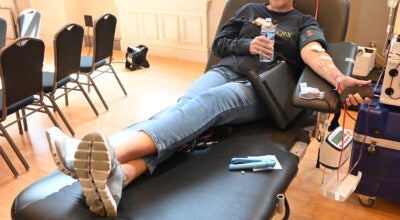Sister’s gift of life: Rockwell woman donating a kidney
Published 12:00 am Sunday, January 6, 2013
ROCKWELL — After watching her battle diabetes for 24 years, Dana Christner can finally do something to help her little sister.
Christner, of Rockwell, will donate a kidney to Geri Whalen in less than two weeks, saving her sister’s life.
Whalen, who lives in Pittsburgh, was diagnosed with Type I diabetes when she was about 9 years old. Since then, she has had to continuously monitor her blood sugar, restrict her diet and give herself four insulin shots per day (she now uses an insulin pump).
In 2007, Whalen learned she had developed kidney disease. Doctors have been managing it with medication, but they now say she needs kidney and pancreas transplants to survive.
“Geri’s first reaction when she found out she needed a kidney transplant was, ‘I guess I’m going to die,’ ” Christner said. “She’s 33, and she has a husband and three young kids. I said, ‘No, you’re not. That’s not an option.’ ”
Christner, 40, a Rockwell resident, immediately volunteered to donate her kidney. She said she didn’t have to think about it, and Whalen didn’t have to ask.
The surgery will take place Jan. 16 at a hospital in Pittsburgh, where the sisters grew up. The date is soon enough that Whalen should avoid starting dialysis treatment.
“I was amazed that she was just so willing and ready to help me in that way,” Whalen said by phone Saturday. “It’s a terrifying feeling, just the amount of uncertainty that I had. … That was a huge load off my mind.”
The sisters say they hope their story will encourage more people to become living organ donors.
According to the U.S. Department of Health and Human Services, about 18 people die every day while waiting for an organ. Some of those waiting depend on deceased organ donors, but some organs and tissues can be given by someone who is alive and well.
“Giving a kidney doesn’t mean the end of your life,” Whalen said. “It’s a gift for someone else to be able to live and be healthy and feel good.”
Christner said she doesn’t think she’s doing anything special, because most healthy people can donate a kidney and save a life.
“God gave us all two kidneys, and we only need one,” she said. “He gave us two so we can give one away to someone who needs it.”
ggg
Once Whalen entered end-stage renal failure, she was placed on a transplant waiting list. At the same time, Christner began the thorough testing process needed before she could become a living donor.
First, medical staff ran state-of-the-art tests to determine whether Christner’s kidney would be a good match for Whalen. Relatives are more likely to match blood types and tissues, which lowers the risk that the recipient’s body will “reject” the new organ.
Then, doctors gave her several medical exams to make sure she is healthy enough to donate, and that she’s not likely to face problems even decades after the surgery.
“They said to me, ‘We’re not going to do this unless you’re going to be OK,’ ” Christner said. “She doesn’t need to feel like she’s taking from me, because she’s not.”
The recipient’s insurance is responsible for all of a donor’s testing related to the transplant, Christner said.
She said doctors told her that if she becomes worried or scared and doesn’t want to go through with the surgery, she can back out at any time. In those cases, they simply tell the recipient that the other person can’t donate.
But Christner said she’s not afraid, probably because she’s too excited.
“I really feel perfectly at ease with it,” she said. “If, God forbid, something horrible happened, what better way could you go?”
There have been changes in the transplant surgery that make it less invasive and traumatic for the donor, Christner said.
She will have a laparoscopic procedure, meaning that surgeons will operate through a few small incisions rather than a large, open one.
Christner said she expects to be home from the hospital in two days and back to work in two weeks. Doctors told Christner that her remaining kidney will begin to grow and do the job of two.
As Whalen recovers from her own operation, she will take anti-rejection drugs to lower the risk of complication even further.
She’ll then be placed on a waiting list for a new pancreas, which has to come from a deceased donor. The demand for pancreas transplants is lower, Christner said, so she shouldn’t have a problem receiving one.
Once both organs are functioning together, Whalen’s diabetes should be much less severe than it is now. The illness she’s had since childhood could even disappear.
“I don’t remember what it’s like to not have it, so I’m really excited to live without having to worry about it all the time,” she said. “But I’m trying not to get too excited about it, just in case it doesn’t completely go away.”
On Jan. 24, a fundraiser to help pay Whalen’s medical costs will be held in Pittsburgh. Her family is also raising money through the National Foundation of Transplants at www.transplants.org.
Christner said she hopes her donation will set an example for her three daughters.
“I’ll say, ‘This is what you do with your sisters, girls,’ ” she said. “You take care of each other no matter what.’”
For more information about becoming a living donor, visit www.organdonor.gov.
Contact reporter Karissa Minn at 704-797-4222.
Twitter: twitter.com/postcopolitics
Facebook: facebook.com/Karissa.SalisburyPostw



